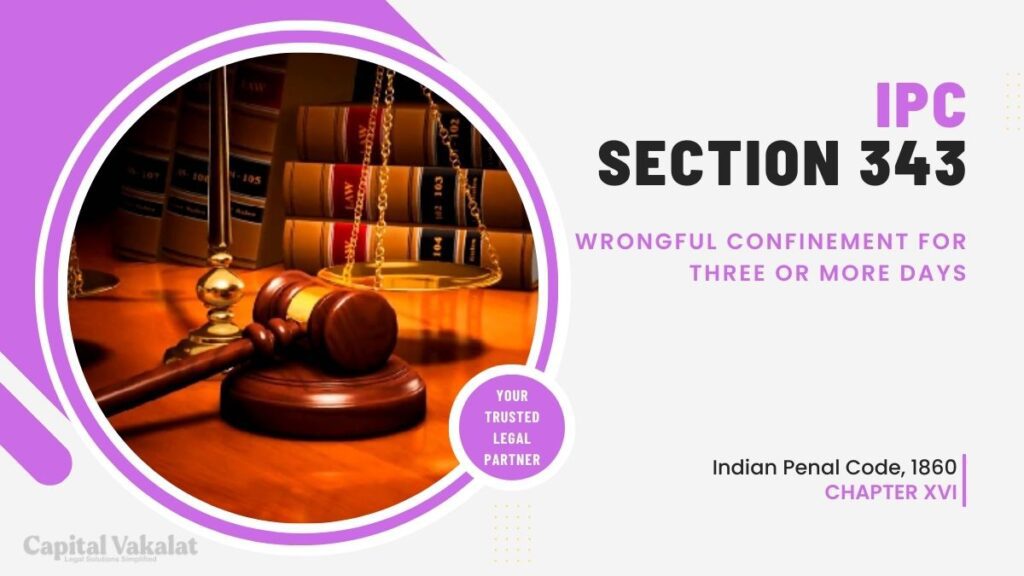Understanding the legal intricacies surrounding wrongful confinement is crucial in navigating the complexities of the Indian Penal Code (IPC). One specific provision, Section 343 IPC, deals with the offense of wrongful confinement for three or more days.

In this article, we will delve into the nuances of this section, exploring its definition, legal implications, and the broader impact on both individuals and society.
Understanding Section 343 IPC
Section 343 of the IPC addresses wrongful confinement, a serious offense that involves intentionally restraining someone against their will. The legal context of this section provides a framework for identifying instances where confinement goes beyond lawful boundaries. To establish a case under Section 343, certain elements must be met, and the potential punishments are clearly outlined.
Instances of Wrongful Confinement
Real-life cases serve as poignant examples of the application of Section 343. These instances highlight the gravity of the offense, showcasing its impact on victims and the legal consequences faced by perpetrators. Analyzing such cases allows us to grasp the severity of wrongful confinement and the need for a robust legal response.
Duration Matters: Three or More Days
A distinctive feature of Section 343 is the specification of a duration – three or more days. This raises important questions about the significance of time in the eyes of the law. We explore why the law draws a line between short-term and prolonged confinement and the implications this has on legal proceedings.
Legal Procedures and Defenses
Navigating legal procedures in cases related to wrongful confinement is a complex task. This section provides an overview of the steps involved in prosecuting such cases, as well as potential defenses that may be raised by the accused. Understanding these aspects is crucial for both legal professionals and the general public.
Challenges in Prosecution
Prosecuting cases under Section 343 comes with its own set of challenges. From the burden of proof to establishing intent, legal practitioners face hurdles in ensuring justice is served. We delve into these challenges and examine legal precedents that have shaped the interpretation of this section over time.
Social Implications
Beyond the legal realm, wrongful confinement has profound societal implications. The article explores the broader impact on individuals, discussing the psychological and emotional toll experienced by victims. This section aims to foster empathy and awareness about the far-reaching consequences of such offenses.
Reform and Amendments
Legal systems are dynamic, and changes to existing laws are not uncommon. We examine any recent reforms or proposed amendments to Section 343 IPC, shedding light on public and legal responses to potential changes. Understanding these developments is essential for staying informed about the evolving landscape of legal provisions.
Awareness and Prevention
Preventing wrongful confinement begins with awareness. This section explores the role of public awareness in curbing such offenses, emphasizing educational initiatives and campaigns that inform people about their legal rights. By empowering individuals with knowledge, we contribute to a society that is vigilant against wrongful acts.
Conclusion
In conclusion, Section 343 IPC is a critical component of the legal framework aimed at protecting individuals from wrongful confinement. This article has delved into its definition, legal implications, and broader societal impact. By understanding the complexities surrounding this section, we contribute to a legal system that is both just and compassionate.
Frequently Asked Questions
What defenses can be used in cases of wrongful confinement?
Defenses may include proving that the confinement was lawful, justifying actions as necessary for self-defense, or challenging the evidence presented.
Are there any recent changes to Section 343 IPC?
As of my knowledge cutoff in January 2022, no significant changes were reported. It’s advisable to check the latest legal updates for any amendments.
How does wrongful confinement impact victims psychologically?
Wrongful confinement can have severe psychological repercussions, leading to trauma, anxiety, and stress for the victims.
What initiatives exist to raise awareness about wrongful confinement?
Various NGOs, legal organizations, and government campaigns work towards educating the public about their rights, contributing to the prevention of wrongful confinement.